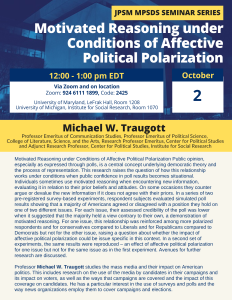Presented By: Michigan Program in Survey and Data Science
JPSM MPSDS Seminar Series - Motivated Reasoning under Conditions of Affective Political Polarization
Michael W. Traugott

JPSM MPSDS Seminar Series
Onsite and via Zoom
Institute for Social Research (ISR), Room 1070
Motivated Reasoning under Conditions of Affective Political Polarization
Motivated Reasoning under Conditions of Affective Political Polarization Public opinion, especially as expressed through polls, is a central concept underlying democratic theory and the process of representation. This research raises the question of how this relationship works under conditions when public confidence in poll results becomes situational. Individuals sometimes use motivated reasoning when encountering new information, evaluating it in relation to their prior beliefs and attitudes. On some occasions they counter argue or devalue the new information if it does not agree with their priors. In a series of two pre-registered survey-based experiments, respondent subjects evaluated simulated poll results showing that a majority of Americans agreed or disagreed with a position they hold on one of two different issues. For each issue, their assessed credibility of the poll was lower when it suggested that the majority held a view contrary to their own, a demonstration of motivated reasoning. For one issue, this relationship was reinforced among more polarized respondents and for conservatives compared to Liberals and for Republicans compared to Democrats but not for the other issue, raising a question about whether the impact of affective political polarization could be issue specific in this context. In a second set of experiments, the same results were reproduced – an effect of affective political polarization for one issue but not for the same issue as in the first experiment. Avenues for further research are discussed.
Professor Michael W. Traugott studies the mass media and their impact on American politics. This includes research on the use of the media by candidates in their campaigns and its impact on voters, as well as the ways that campaigns are covered and the impact of this coverage on candidates. He has a particular interest in the use of surveys and polls and the way news organizations employ them to cover campaigns and elections
Onsite and via Zoom
Institute for Social Research (ISR), Room 1070
Motivated Reasoning under Conditions of Affective Political Polarization
Motivated Reasoning under Conditions of Affective Political Polarization Public opinion, especially as expressed through polls, is a central concept underlying democratic theory and the process of representation. This research raises the question of how this relationship works under conditions when public confidence in poll results becomes situational. Individuals sometimes use motivated reasoning when encountering new information, evaluating it in relation to their prior beliefs and attitudes. On some occasions they counter argue or devalue the new information if it does not agree with their priors. In a series of two pre-registered survey-based experiments, respondent subjects evaluated simulated poll results showing that a majority of Americans agreed or disagreed with a position they hold on one of two different issues. For each issue, their assessed credibility of the poll was lower when it suggested that the majority held a view contrary to their own, a demonstration of motivated reasoning. For one issue, this relationship was reinforced among more polarized respondents and for conservatives compared to Liberals and for Republicans compared to Democrats but not for the other issue, raising a question about whether the impact of affective political polarization could be issue specific in this context. In a second set of experiments, the same results were reproduced – an effect of affective political polarization for one issue but not for the same issue as in the first experiment. Avenues for further research are discussed.
Professor Michael W. Traugott studies the mass media and their impact on American politics. This includes research on the use of the media by candidates in their campaigns and its impact on voters, as well as the ways that campaigns are covered and the impact of this coverage on candidates. He has a particular interest in the use of surveys and polls and the way news organizations employ them to cover campaigns and elections